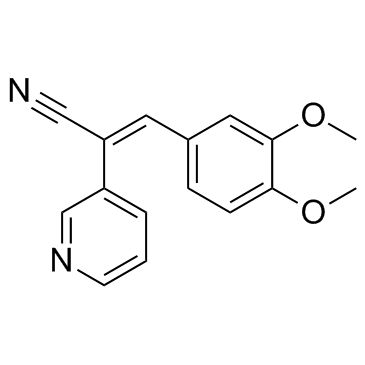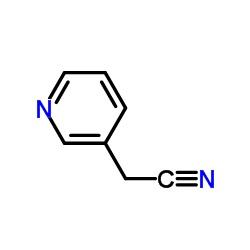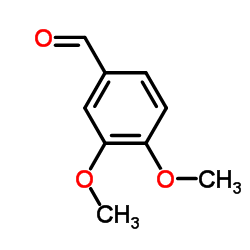136831-48-6
| Name | tyrphostin rg 13022 |
|---|---|
| Synonyms |
2-(3,4'-Dimethoxyphenyl)-1-(3''-pyridinyl)acrylonitrile
MFCD00236444 RG-13022 |
| Description | RG13022 is a tyrosine kinase inhibitor; inhibits the autophosphorylation reaction of the EGF receptor with an IC50 of 4 μM. |
|---|---|
| Related Catalog | |
| Target |
IC50: 4 μM (EGF receptor autophosphorylation)[1] |
| In Vitro | RG13022 suppresses EGF-stimulated cancer cell proliferation. In a cell-free reaction RG13022 inhibits the autophosphorylation reaction of the EGF receptor in immunoprecipitates with an IC50 of 4 μM. RG13022 inhibits colony formation and DNA synthesis by HER 14 cells, which were stimulated by 50 ng/mL EGF, in a dose-dependent manner. The IC50s are 1 and 3 μM for HER 14 colony formation and DNA synthesis, respectively[1]. RG-13022 inhibits not only EGF-induced growth but also growth stimulated by insulin, insulin-like growth factor I, insulin-like growth factor II, or transforming growth factor alpha. RG-13022 also totally blocks estrogen-stimulated phosphorylation of the EGF receptor, as well as estrogen-induced cell proliferation, suggesting that functioning TK pathways are required for estrogen action[2]. |
| In Vivo | RG13022 suppresses tumor growth in nude mice. RG13022 also increases the life span of these tumor-bearing nude mice[1]. |
| Cell Assay | 40 mM stock solutions of RG13022 is made in 100% DMSO and diluted with the culture medium before addition to the cells. MH-85 cells and HER 14 cells are plated in culture medium in the presence or absence of increasing concentrations of RG-13022 or RG-14620 for 10 days. At the end of culture, the cells are fixed with 4% (v/v) formaldehyde and stained with hematoxylin. Numbers of colonies including more than 20 cells in each well are counted under the microscope[1]. |
| Animal Admin | Mice: MH-85 tumors 5 mm in diameter are inoculated s.c. into the right dorsal portion of 4- to 6-week-old male BALB/c nu/nu mice. RG-13022 or RG-14620 in 0.1 ml 100% DMSO is injected i.p. twice a day from 1day after MH-85 tumor inoculation. Control animals are given the same vehicle. Tumor sizes are measured once a week under anesthesia with nembutal (0.05 mg/g body weight, i.p.) and calculated[1]. |
| References |
| Density | 1.172g/cm3 |
|---|---|
| Boiling Point | 423.8ºC at 760mmHg |
| Melting Point | 118 °C |
| Molecular Formula | C16H14N2O2 |
| Molecular Weight | 266.29500 |
| Flash Point | 210.1ºC |
| Exact Mass | 266.10600 |
| PSA | 55.14000 |
| LogP | 3.16298 |
| Vapour Pressure | 2.18E-07mmHg at 25°C |
| Index of Refraction | 1.605 |
| Personal Protective Equipment | Eyeshields;Gloves;type N95 (US);type P1 (EN143) respirator filter |
|---|---|
| Safety Phrases | S22-S24/25 |
| RIDADR | NONH for all modes of transport |
|
~% 
136831-48-6 |
| Literature: Biersack; Zoldakova; Effenberger; Schobert European Journal of Medicinal Chemistry, 2010 , vol. 45, # 5 p. 1972 - 1975 |

